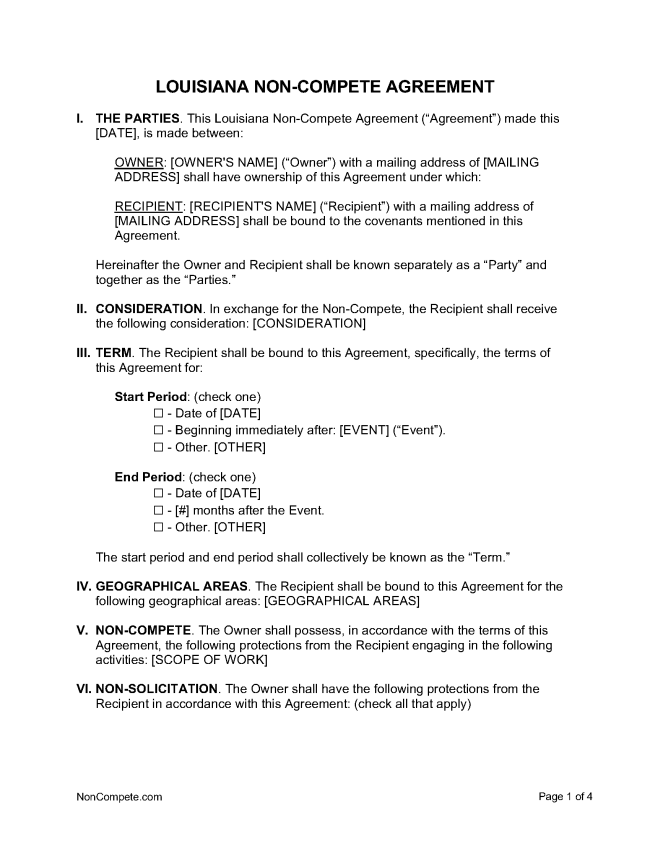A Louisiana non-compete agreement is a legal restrain that prevents a party to the agreement from performing work that is in direct competition with the other party. Public policy in Louisiana is opposed to non-compete agreements, and as a result, it has some of the strictest standards for enforcing the deals in the country. The state’s courts will read the agreements closely, and even minor issues can invalidate them.
Table of Contents |
Are Non-Competes Enforceable in Louisiana?
Under certain circumstances, yes. Although typically forbidden under Louisiana law, non-compete agreements are allowed in contracts for
- The sale of a business
- Employment, and
- The dissolution of a partnership.
These agreements may only apply when there is competition between the party seeking to enforce the non-compete and the party opposing enforcement. La. RS § 23:921.
The parties in a corporation, limited liability company, partnership, or franchise may also establish enforceable non-compete agreements. La. RS § 23:921.
Application
Because Louisiana has a general policy against agreements that restrict competition, non-compete agreements will be “strictly construed.” (Vartech Systems Inc. v. Hayden (2006)) This means that courts will require high standards for them to be enforceable and, where ambiguous, may decline to enforce the agreement.
Strictly construing non-compete agreements also comes up in courts’ willingness to modify agreements. See the “Blue Penciling” section below.
Actual Competition
Non-compete agreements are only permissible against a former employee when the employer is “carrying on a like business therein.” La. RS § 23:921(C). This means there must be actual competition between the employer’s business and the former employee when enforcement is sought. (Causin, L.L.C. v. Pace Safety Consultants, LLC (2019))
Employers do not need to define their business specifically but may not draft agreements that are overbroad and prevent a former employee from making a living in any segment of the industry. Paradigm Health System, L.L.C. v. Faust (2017)).
Independent Contractors
Non-compete agreements may be enforced against independent contractors. Such agreements face the same rules as those for non-compete agreements contained in employment contracts. La. RS § 23:921(C).
Territory Covered
To be enforceable, non-compete agreements must specifically identify the cities or parishes in which they apply. Simply providing a geographic description, such as a radius from a point, will make the agreement invalid. (Zanella’s Wax Bar, LLC v. Trudy’s Wax Bar, LLC (2019)).
Non-Solicitation and Non-Disclosure
Louisiana treats non-solicitation agreements, which prevent former employees from soliciting business customers, the same as non-compete agreements. (Millet v. Crump (1997))
However, a confidentiality agreement is never considered an unreasonable restraint of trade. (Neill Corporation v. Shutt (2021))
Prohibited Professions
Attorneys cannot be a party to an employment contract or partnership agreement that requires them to forgo an aspect of their practice in the future. Rule 5.6(a), Louisiana Rules of Professional Conduct.
Attorneys cannot enter case settlements that limit their right to practice in the future. Rule 5.6(b), Louisiana Rules of Professional Conduct.
Non-compete agreements involving people with a salesman’s license issued by the Louisiana Motor Vehicle Commission or the Louisiana Used Motor Vehicle Commission are not valid. La. RS § 23:921(I).
Terminating an Employee
When the employer has the right to terminate an employee at any time, termination does not make a non-compete agreement unenforceable. (Cellular One, Inc. v. Boyd (1995)).
Burden of Proof
For a non-compete agreement to be enforced, the party seeking enforcement does not need to prove “irreparable injury,” the standard typically required for a court order. It must prove that the other party failed to follow the agreement.
For example, in Environmental Safety & Health Consulting Services, Inc. v. Fowler (2020), the employer proved that the agreements were part of valid contracts and met the statutory requirements. Then, the court held that the agreement should be enforced because the employer showed:
- The employee went to work for a different company within a time covered by the agreement;
- The employee was working in one of the places expressly prohibited by the agreement; and
- The employee’s new company was a competitor.
Continued Employment (consideration)
Continued employment appears to be adequate consideration to support a non-compete agreement. In Sola Communications, Inc. v. Bailey (2003), the court agreed to enforce a non-compete agreement contained in a broader contract that provided the employee with a greater salary and a new title. They worked at the company for about two years.
It is unclear how a court would view a non-compete agreement in which the employee is offered the same at-will position they already hold.
Maximum Term
Non-compete agreements in Louisiana cannot last longer than two years. La. RS § 23:921.
Blue Penciling (allowed)
Courts may modify a non-compete agreement to make it enforceable. (SWAT 24 Shreveport Bossier, Inc. v. Bond (2001))
This power, however, is limited to striking offending language. Courts cannot rewrite portions of an agreement to make it enforceable. (Summit Institute for Pulmonary Medicine and Rehabilitation, Inc. v. Prouty (1997))
